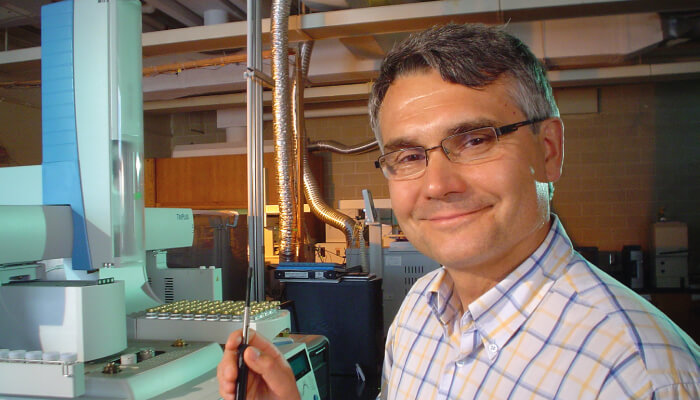What motivates you?
I’m driven to have a positive impact. Doing science is an ongoing process of discovery, and just as Copernicus was inspired by the need to discover the truth about the cosmos, we’re inspired to elucidate the principles underlying analytical technologies, new instrumentation and methods, simpler measurements, and more environmentally friendly approaches. Being able to build strong collaborative partnerships also keeps me excited and motivated to continue driving new discoveries.

You invented solid-phase microextraction (SPME) over three decades ago – what are you working on today?
We’re developing optimum devices and conditions for novel integrated sampling and sample preparation strategies that will have a positive impact on all manner of fields, from the clinic to food and environmental determinations. The challenge lies in ensuring the mass transfer is controlled by diffusion through the boundary layer, rather than the thickness of the sorbent coating. Recently, we have developed sampling and extraction devices in the form of thin films, such as a carbon fabric or metal blade, that has proven to be significantly more efficient than previous structures. We’re also working with magnetic particles to enhance the efficiency of sample enrichment by taking advantage of radial diffusion effects followed by MS with appropriate ion sources, and are investigating direct sample introduction approaches (coated blade sprays) and the use of drones for sample transport.
What’s your most satisfying career milestone?
The translation of SPME into the operating theater for the evaluation of human organs. We’ve developed SPME devices the size of an acupuncture needle that surgeons are not afraid to put into the human body, and which provide a chemical signature indicative of organ function and quality. This success implies that the approach could be translated into other settings too, because looking at food or the environment also requires chemical signatures. This application has been around 30 years in the making, so it’s very satisfying to see that finally fulfilled. We’re now using it to sample the human lungs and brains for cancer treatment applications.
Would you say analytical scientists are responsible for more than just data?
When analytical chemists get involved in a project, they typically work to provide the necessary feedback rapidly. As such, familiar approaches are preferred, and newer, more powerful techniques may be ignored unless standard approaches do not fully address the challenge at hand. In an ideal world, analytical scientists would consider the utility of all approaches when tackling a problem; of course, the analyst is responsible for demonstrating the usefulness of technologies to contribute to specific issues.
Global warming and pollution are issues with which we are all familiar, and as the challenges associated with them continue to grow, momentum is building – particularly amongst younger people – towards increased pressure on the global community and individual governments to address the problems. Analytical scientists will play a key role in providing and presenting data to government and citizens as efforts to combat the issues continue. Greener, cheaper and faster screening methods will prove central to these challenges.
Is that why you’re such a prominent proponent of green chemistry?
It’s simple: green chemistry is the future. We’re facing an enormous challenge, and you can argue that analytical chemistry contributes little to the broader picture. But we too should play our part. One way to address the problem is to incorporate green technologies into our work, and to find ways to reduce the pollution originating from analytical laboratories.
What are the barriers to adopting green technologies?
Speaking to analytical scientists feels like preaching to the converted. The discrepancy, however, comes in practice, where there seems to be a mental barrier preventing the field from adopting new green technologies. Do people worry that it will be inconvenient or do they believe they don’t have the expertise? That’s difficult to determine. What’s clear is that the technology has been around for a long time and it’s not difficult to implement; it’s not something out of this world. If we want to look more seriously at adopting alternatives, we must employ a form of leadership; we cannot always pass the responsibility onto others. Swift action is needed.
What is your message to analytical scientists – young and old alike?
Life is like a series of laboratory experiments – complex and ever-changing. If you want to be successful, don’t just start doing something out of the blue. Instead, you need to look at current trends and identify areas that need technological improvements. When I first started my career, the effect of pollution on the ozone layer was already known, and I realized then that this was just the beginning of a long-term shift towards greener technologies. If you can identify an area in need, and find a way to solve the problem, then you’re never going to lose. Of course, your approach has to be unique, because you will face competition. If you’re a young scientist working on the same problem as your senior peers, it’s going to be very difficult to gain recognition – but that’s not to say you can’t with a little ingenuity!




